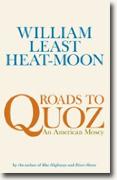Roads to Quoz
William Least Heat-Moon
book reviews:
· general fiction
· chick lit/romance
· sci-fi/fantasy
· graphic novels
· nonfiction
· audio books
· author interviews
· children's books @
curledupkids.com
· DVD reviews @
curledupdvd.com
newsletter
win books
buy online
links
home
for authors
& publishers
for reviewers

 |
Roads to Quoz: An American Mosey William Least Heat-Moon Little, Brown Hardcover 592 pages October 2008 |
|
A quarter of a century ago, William Least Heat-Moon (the pen name of William Trogdon) wrote a book called Blue Highways. Readers intrigued by his strange self-created name and the allure of the title bought the book in their thousands, then millions, making it a minor classic. Commonly referred to as a "travelogue", it was really an odyssey, the inner saga of a man who lost his job and wife and set out to find himself somewhere along the road.
The book is not a mere travelogue, though it traverses the American landscape at a "moseying" pace. It is also a long ramble of memory moving through time to real or imagined stories Heat-Moon has gathered over his career of riding, listening, and taking notes. Stories from the past include the moral fable of a man who found he had a special talent. Always having wanted to make something of himself, he lost something of himself when he was wounded in the Korean War. But he found that he had gained something back – he became a masterful physical therapist who treated the special problems of lonely widows. He wasn't in it for the money – all he wanted in return was to found a school for lost and troubled children. With the donations he garnered from his flock of grateful older women, he would establish "Kactus Kids" – an academy of folk arts and philosophy. His dream died when an ambitious woman scammed him, and he wound up feeling like a nobody again. Fascinating to me because I am a bicyclist were Heat-Moon's descriptions (with one illustration) of the Railcycle, the invention of Richard Smart of Coeur D'Alene, Idaho. A relatively simple concoction of magnets and skate wheels, the bicycle is designed to ride one rail while connected to the other for stability. It zooms along using pedal power, but is not recommended for people with a fear of heights because trestle riding, as Heat-Moon found out, is an art in itself. Smart calls railcycling "America's slowest growing sport" though he has fashioned many railcycles and holds a patent. The claim is made that, trestles notwithstanding, railcycling is safe enough for even blind people to enjoy, and word has it that it is popular in Sweden. The loss of railroads in the U.S. (and, I would add, their conversion into rail-trails sans rails and crossties for those of who use conventional bikes) would seem to militate against a sudden upsurge in the purchase of railbikes, but who knows? With everyone being encouraged to take up human-powered travel as an alternative source of energy, perhaps it will catch on. In one chapter Heat-Moon relates stray remarks he overheard on his travels and had the wit to record. My favorite is: Old fellow to young man: "You look more like I used to look like than I ever did." Heat-Moon's prose is always rich in good words and salient imagery: "At sunset on a Sunday we came into a landscape of subterranean percolations of water rising through limestone to form rivers and creeks and lakes, only to, as if having seen enough of the new Florida, disappear again into the pervious rock, sometimes reemerging as a spring or resuming as a stream willing to try the territory again. While not hollow, Florida a few inches down is as porous as a weathered thighbone you might find in a High Plains pasture." Originally published on Curled Up With A Good Book at www.curledup.com. © Barbara Bamberger Scott, 2008 |
|
|
|
 Click here to learn more about this month's sponsor! |
|
| fiction · sf/f · comic books · nonfiction · audio newsletter · free book contest · buy books online review index · links · · authors & publishers reviewers |
|
| site by ELBO Computing Resources, Inc. | |
 Now Heat-Moon is back on the roads, with a new and obviously more attached wife by the name of (well, for purposes of this book anyway) Q – just Q. Her name provides the inspiration for the title, an invented word that signifies an inner quest for that quirky region occupied but not circumscribed by the letter Q. Quoz is the thinking person's Oz, and Heat-Moons adventures with Q (Sancho Panza to his Don Quixote) are a yellow brick road of happy happenstance to replace the blue of former highways.
Now Heat-Moon is back on the roads, with a new and obviously more attached wife by the name of (well, for purposes of this book anyway) Q – just Q. Her name provides the inspiration for the title, an invented word that signifies an inner quest for that quirky region occupied but not circumscribed by the letter Q. Quoz is the thinking person's Oz, and Heat-Moons adventures with Q (Sancho Panza to his Don Quixote) are a yellow brick road of happy happenstance to replace the blue of former highways.